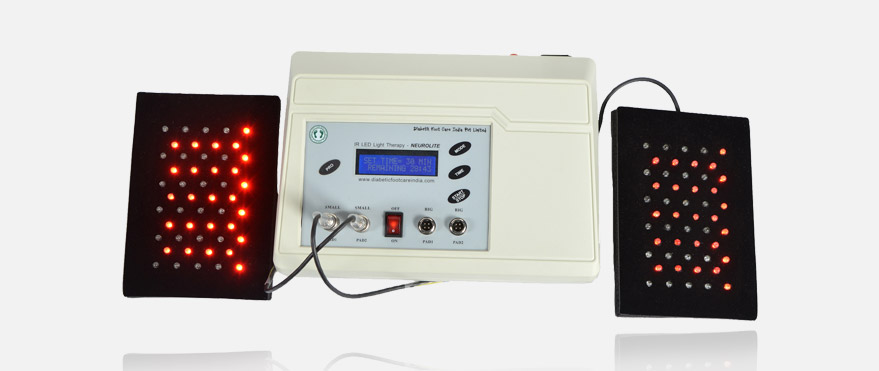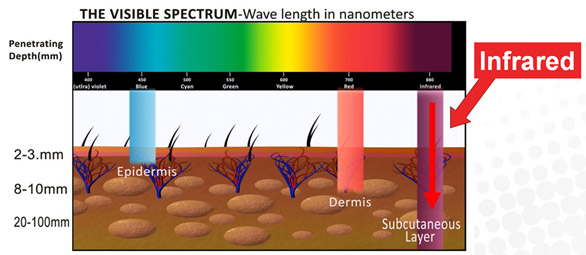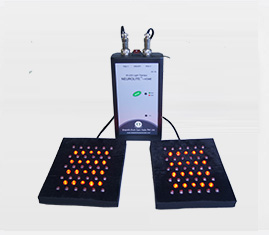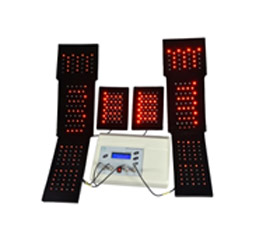Light Therapy - LED IR Light therapy

LED IR Light therapy- Light Therapy

Introduction to Light Therapy:
Infrared Light Therapy, or photo-biomodulation, is a unique therapy that harnesses the healing powers of infrared light. It emits specials wavelengths of light energy that dramatically increase circulation to injury sites and areas of chronic pain. The result is a rapid relief of discomfort, improvement in sensation, and regeneration of damaged tissues.. The greatest physiological responses are achieved through a unique combination of power, wave length, duty cycle, viewing angles, voltage, frequencies, LED density/sq.cm and overall coverage.
Treatment with the Light Therapy system is simple and painless. Flexible pads, containing multiple infrared and visible red diodes, are placed directly on the skin over the area of pain or injury. Light energy from the diodes penetrates beneath the skin and is absorbed by proteins within cells that lay beneath the skin. Those cells release nitric oxide, the body’s natural vasodilator. After just 20 minutes of treatment, blood flow is increased to nerves and other tissues, and this boost in local circulation persists for several hours after the pads are removed.
Photobiomodulation Therapy (PBMT) is the process of modulating the organelles of the body with wavelength specific photon energy to increase respiratory metabolism, reduce the natural inflammatory response, accelerate recovery of injury or stress at the cellular level and increase circulation..NASA research has determined that the radiant Power of Flux to produce reliable Photobiomodulation Therapy (PBMT) results must be equal to or greater than 0.050 W/cm2 (50mW/cm2). Depending upon tissue/muscle density or depth of injury, multiple doses may be required.
Light therapy has been established as a useful tool to:
Increase vascularity (circulation) by increasing the formation of new capillaries that replace damaged ones. New capillaries speed up the healing process by carrying more oxygen as well as more nutrients needed for healing and they can also carry more waste products away.
Stimulate the production of collagen:
Collagen is the most common protein found in the body. Collagen is used to repair damaged tissue and to replace old tissue. It is the substance that holds cells together and has a high degree of elasticity. By increasing collagen production less scar tissue is formed at a wound or incision.
Stimulate the release of adenosine triphosphate (ATP):
ATP is the major carrier of energy to all cells. Increases in ATP allow cells to accept nutrients faster and get rid of waste products more quickly by increasing the energy level in the cell. All food turns into ATP before the cells utilize it. ATP provides the chemical energy that drives the chemical reaction of the cell.
Increase lymphatic system activity:
Edema is the swelling or natural splinting process of the body. Edema has two basic components: the first is a liquid part, which can be evacuated by the blood system, and the second is comprised of the proteins that have to be evacuated by the lymphatic system. Research has shown that the lymph vessel diameter and the flow of the lymph system can be doubled with the use of light therapy. The venous diameter and the arterial diameters can also be increased. This means that both parts of edema (liquid and protein) can be removed at a much faster rate to relieve swelling.

Reduce the excitability of nervous tissue: The photons of light energy enter the body as negative ions. This calls upon the body to send positive ions, like calcium among others, to go to the area being treated. These ions assist in firing the nerves thereby relieving pain.
Stimulate fibroblastic activity that aids in the repair process:
Fibroblasts are present in connective tissue and are capable of forming collagen fibres.
Induce a thermal like effect in the tissue:
: The light raises the temperature of the cells through a photochemical reaction.
Stimulate tissue granulation and connective tissue projections:
Part of the healing process of wounds, ulcers or inflamed tissues.
What can the Light Therapy do?:
- Helps pain relief.
- Helps increase blood supply to the affected area.
- Helps to reduce swelling.
- Helps to stimulate the immune system.
- Helps to stimulate nerve conduction.
- Helps develop collagen and muscle tissue
- Helps generate new cells and tissue repair.
- Can be used in conjunction with conventional and alternative therapy.
- Helps increase speed, quality and strength of cell tissue repair.
- Helps to promote faster wound healing and clot formation.




